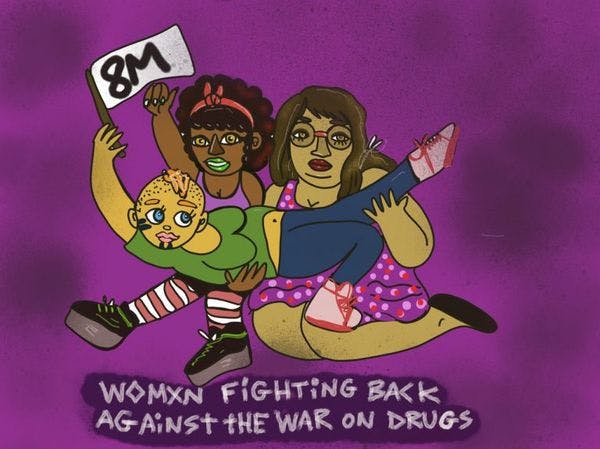The Barcelona declaration
In 2019, February more than 40 womxn from Europe and Central Asia met in Barcelona to work together on intersectional feminism, drug policy, harm reduction and human rights, where the Barcelona Declaration was initiated. If you/ your organization would like to support the Declaration, please complete the form below.
The Barcelona Declaration
On International Women’s Day 2019, we declare that the War On Drugs is a war on Womxn Who Use Drugs
The War On Drugs is racist, sexist, classist and heterosexist, and disproportionately affects womxn of colour, youth and womxn in poor communities.
As womxn, trans and gender non-conforming people surviving this war, we reject the widespread stigma, discrimination and criminalisation we face in our daily lives. We call for complete reform and transformation of the current system of prohibition. We call for an end to the ignorant and negative rhetoric.
Drug treatment services are gendered, classed, sexualised and racialised. Drug ‘treatment’ itself is based on spurious and outdated research, and allows unbridled and unregulated power over the individual. We reject these methods and the ideologies underpinning them.
Global and systemic oppressions violate our rights, as womxn, trans and gender non-conforming people who use drugs, and situate us in multiple, interconnected, vulnerable positions, which lead to numerous harms:
- As womxn who inject drugs, we have a higher prevalence of HIV and Hepatitis than men. Despite this, we don’t appear in data and endure discrimination and exclusion from social and health services. The few resources we have tend to be masculinised and inaccessible as well as often not meeting our needs, interests or expectations.
- We are disproportionately impacted by structural violence and social control from the State (policing, limited access to legal aid, extortion, long prison sentences, rape, extrajudicial murder and capital punishment).
- The majority of womxn in prison are sentenced for non-violent drug related offences. Womxn of colour, ethnic minorities, non-binary or trans, and the homeless are particularly targeted. In several countries, we face detention in compulsory, unregulated ‘treatment” centres , often for indefinite periods with little or no access to judicial processes. Incarceration in closed settings creates a context for increased human rights violations, such as rape and extortion.
- We often experience endemic violence and exclusion within our own communities and families. Not only are we more likely to be assaulted by our partners, but we are less likely to have recourse to justice and protection
- We suffer intrusion into our bodily and physical integrity, maternal and family life and domestic space. We face routine violations of our sexual and reproductive health rights, by both community and state such as coerced sterilization and pregnancy termination.
- Stigma that assumes womxn who use drugs cannot take care of their children and misinformation on the effects of drug use feeds into strong pressures to end pregnancy. When we don’t terminate our pregnancies, there’s a strong possibility we will lose custody of our children.
- Those of us who are sex workers, and especially trans womxn and womxn living with disabilities cope with an unacceptable and compounded web of stigma, discrimination and social exclusion.
Despite living with these and other multiple forms of violence daily, Womxn Fighting back Against the War On Drugs are resourceful, enterprising, creative and strong. We possess remarkable resilience. We fight back against prohibition with solidarity, mutual support and leadership, building our networks from the grassroots to the global, from immediate action to long-term strategies to end this war on womxn who use drugs. We embrace intersectional and anti-prohibitionist feminism that integrated queer/trans-inclusive and non-ableist approaches, racial justice and the right to use drugs and experience pleasure. We work to reclaim our bodily sovereignty, including rights to the full range of sexual and reproductive health, gender-sensitive health services, and rights to use drugs. We do not ask for charity but for solidarity. We demand to live in safety and freedom.
This declaration is an invitation to join forces with womxn like us, womxn who demand an end to the War on Drugs and the negative impact it has on all our lives.
“Let us all cause some trouble and begin to change the world with and for women who use drugs with our powerful conceptual armaments in hand.” Elizabeth Ettorre
Our bodies – our choice, our rights, our voice.
#narcofeminism #femdrug
Regions
Related Profiles
- European Network of People who Use Drugs (EuroNPUD)
- Agência Piaget para o Desenvolvimento (APDES)
- Andrey Rylkov Foundation for Health and Social Justice
- Eurasian Harm Reduction Association
- Eurasian Network of People Who Use Drugs (ENPUD)
- Forum Droghe
- Iglesia Evangélica Protestante de El Salvador (IEPES)
- India HIV/AIDS Alliance
- International Center for Ethnobotanical Education, Research & Service (ICEERS)
- International Network of Women Who Use Drugs (INWUD)
- Polish Drug Policy Network
- Release
- Women and Harm Reduction International Network (WHRIN)
- Youth Organisations for Drug Action
